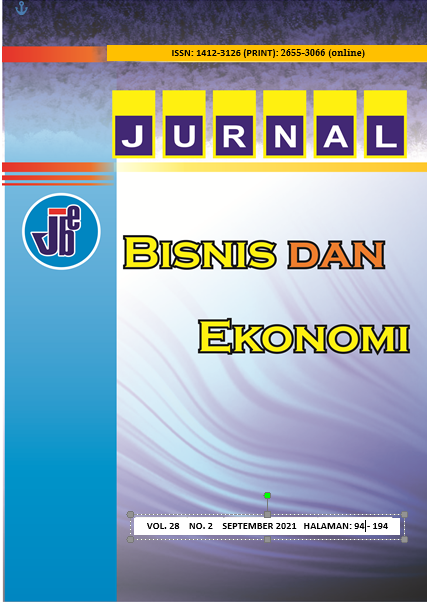Pengaruh Budaya Organisasi, Pengendalian Internal dan Moralitas Individu Terhadap Pencegahan Fraud pada Inspektorat Provinsi Papua
Abstract
This study aims to analyze the effect of self efficacy, locus of control, and personality type on audit judgment. This type of research is explanatory research and the theory used in this research is Fraud Triangle Theory and Moral Kolhberg Theory. The population used is auditors who work at Regional Inspectorate Papua Province. The number of samples was 35 people, who were selected by purposive sampling method and used primary data, which was done by collecting questionnaires. The analytical method used is the method of multiple regression analysis and hypothesis testing is done using a partial test. The results showed that organizational culture has a positive and insignificant effect on fraud prevention, internal control has a positive and significant effect on fraud prevention, and individual morality has a negative and significant effect on audit judgment.
References
Karyono. (2013). Forensic Fraud. Yogyakarta: Andi.
Kohlberg, L. (1994). Tahap-tahap Perkembangan Moral. Yogyakarta: Kanisius.
Jurnal:
Andi. (2014). Pengaruh Efektivitas Pengendalian Internal, Persepsi Kesesuaian, Kompensasi, dan Moralitas Individu terhadap Kecendrungan Kecurangan Akuntansi. Jakarta: Ultima Akunting.
Aprilia, K. W. (2021). Pengaruh Kompetensi Aparatur Desa, Moralitas Individu dan Budaya Organisasi terhadap Pencegahan Kecurangan (Fraud). Hita Akuntansi dan Keuangan Universitas Hindu Indonesia, 25-45.
Cressey, D. R. (1953). The Criminal Violation of Financial Trust. American Sociological Review, 738-743.
Dinata, d. (2018). Menyingkap Budaya Penyebab Fraud: Studi Etnnografi Di Badan Usaha Milik Negara. Jurnal Economia Vol. 14 No. 1.
Eliza, Y. (2015). Pengaruh Moralitas Individu dan Pengendalian internal terhadap kecendrungan kecurangan akuntansi (Studi Empiris Pada Skpd Di Kota Padang). Jurnal Akuntansi, Vol. 4, No. 1, 86-100.
Hariawan , I. M. H., (2020). Pengaruh Kompetensi Sumber Daya Manusia, Whistleblowing System dan Moralitas Individu terhadap Pencegahan Kecurangan (Fraud) Dalam Pengelolaan Keuangan Desa.
Jaelani, A. (2020). Pengaruh Religiusitas, Pengendalian Internal dan Budaya Organisasi terhadap Pencegahan Fraud dengan dimoderasi oleh work family conflict.
Novi, A. (2018). Pengaruh Pengendalian Internal, Kesesuaian Kompensasi dan Budaya Organisasi terhadap Kecenderungan Kecurangan. E-Jurnal Akuntansi Universitas Esa Tunggal.
Petrascu, A. T. (2014). The Role of Internal Audit in Fraud Prevention and Detection. International Economics Conference. Procedia Economics and Finance 16, 489-497.
Pradana, H. H. (2018). Efektivitas Pengendalian Internal, Moralitas dan Integritas terhadap Pencegahan Fraud . Jurnal Bisnis dan Ekonomi Vol.25, 104-111.
Rodiah, (2019). Knowledge Sharing Behaviour: the Effect of Psychologicsl Safety on Balance Scorecard Implementation. Journal of Accounting and Investment.
Sari, U. &. (2017). Pengaruh Pengendalian Internal dan Moralitas Individu pada Kecendrungan Kecurangan Akuntnasi. Universitas Udayana.
Sholehah, d. (2018). Pengaruh Pengendalian Internal, Moralitas Individu dan Personal Culture Terhadao Kecurangan Akuntansi. ATESTASI : Jurnal Ilmiah Akuntansi.
Suastawan, I. M. (2017). Pengaruh Budaya Organisasi, Proactive Audit dan Whistleblowong Terhadap Pencegahan Kecurangan Dalam Pengelolaan Dana Bos. e-Jurnal SI.Ak Universitas Pendidikan Ganesha Vol.7.
Sujana, L. (2019). Pengaruh Kompetensi SDM, Moralitas dan Sistem Pengendalian Internal terhadap Pencegahan Fraud dalam pengelolaan dana desa.
Suprapta. (2021). Pengaruh Pengendalian Intern Kas, Financial Pressure, Kesesuaian Kompensasi dan Moralitas Individu. Hita Akuntansi dan Keuangan Universitas Hindu Indonesia.
Wardana, (2017). Pengaruh Pengendalian Internal, Whistleblowing System dan Moralitas Aparat Terhadap Pencegahan Fraud pada Dinas Pekerjaan Umum Kabupaten Buleleng. Vol 8. No. 2.
Copyright (c) 2023 Anthony Holly

This work is licensed under a Creative Commons Attribution 4.0 International License.











